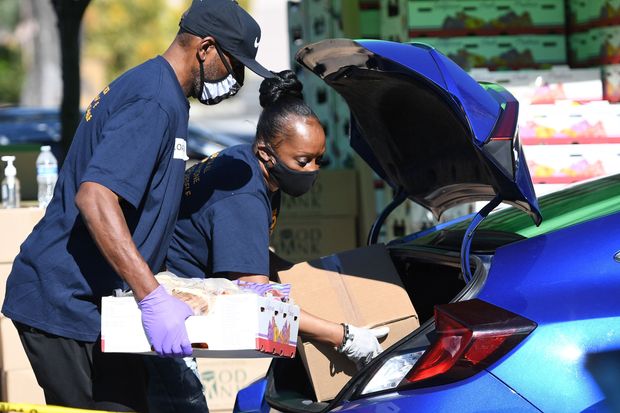
Volunteers load free groceries into cars for people in need at a food bank in Los Angeles.
Getty Images
The economy could accomplish a full recovery within a few years, but policies to address the COVID-19 crisis—both the public health challenges and recession—have been inadequate and shortsighted. Now Congress has let supplemental unemployment benefits lapse, and that will subtract $72 billion each month from household income—and even that was not enough.
Democrats and the Republicans need to compromise and provide supplemental unemployment benefits and monthly stimulus checks to all households for the duration of the crisis. This should not be confused with a universal basic income, because it would expire once the economy is functioning on all cylinders again.
Early on, President Donald Trump had lots of help from House Speaker Nancy Pelosi, New York Gov. Andrew Cuomo and New York City Mayor Bill de Blasio denying the dangers posed by the virus but as events unfolded, he continued to eschew expert advice. We still lack a coherent national framework—championed by a president who appears in command—that governors can apply for closures and reopenings, testing, contact tracing and social distancing similar to policies in Europe.
European governments were more patient about reopening than U.S. states, infections peaked on the continent in April and remain well below that level. Here new cases fell initially and then pushed up to a new high. We got a second acceleration that continental Europe avoided—at least so far.
With the virus surging in Arizona, Texas, Florida and other southern states, businesses are digging in for a long period of depressed economic activity andconsumers remain cautious.
Shutting the economy temporarily effectively shut many small businesses for good. Although 7.5 million workers returned to work in May and June, the Bureau of Labor Statistics reports 1.6 million jobs have been permanently lost since February, 4.6 million adults have quit the labor force altogether and state and local governments have released 1.5 million workers.
Democrats in Congress and the Administration approached COVID-19 as a temporary emergency. Households received a single stimulus payment, the Paycheck Protection Program initially required that 75% of the money be spent on wages and within eight weeks and federal supplemental unemployment benefits were funded for only four months.
With new infections substantially elevated—and the fall perhaps a more friendly season for COVID-19—more aid is needed. Well into 2021, large numbers of Americans will work at home more, fly less, eat more delivered meals, require less office space in cities and visit crowed amusements less.
The jobs problem has become structural and will endure after COVID-19 is conquered. Brick-and-mortar retailing, airlines and many other businesses have lost more customers more quickly than had the virus not forced changes in the ways we spend our money and do business. Simply sending money to businesses to keep workers on payrolls will fail; once the money runs out, more permanent layoffs will follow.
States face significant income and sales tax shortfalls through 2021.
Negotiations to renew the federal supplement to unemployment benefits are bogged down over Republican concerns that $600 weekly added to state benefits could discourage the unemployed from taking jobs as the economy reopens—they are offering $200 a week.
Both sides agree on another round of one-time stimulus checks to lower- and middle-income households. That is hardly enough given the expected duration of the crisis—nearly half of all households in America have lost income and the initial rounds of means tested stimulus payments, PPP and supplemental unemployment benefits didn’t reach many of them.
Better to send every adult $1,000 a month plus $500 for each child until the crisis passes. Let the progressive income tax enforce fairness instead of cumbersome income tests. Consumer demand would pull employment to the industries with stronger growth prospects.
In addition to their stimulus checks, send every unemployed worker $325 a week in supplemental unemployment benefits until unemployment falls to 5%. Along with state benefits, most unemployed would not be paid more to stay home than they could earn working. Those who returned to work would still receive the household payments plus their pay, creating an incentive to take a job.
Send every business $1,000 per full-time-equivalent employee each month until unemployment is 5%—no matter what they are paid—if they pay each worker a minimum of $10 an hour.
Finally, honor the National Governors’ Association request for $500 billion to cover lost state and local revenue over the next two years.
It would be a lot less complex than the CARES Act, help maintain vital public services and provide clear incentives and rewards to seek and create jobs.
Peter Morici is an economist and emeritus business professor at the University of Maryland. Follow him on Twitter @pmorici1.



